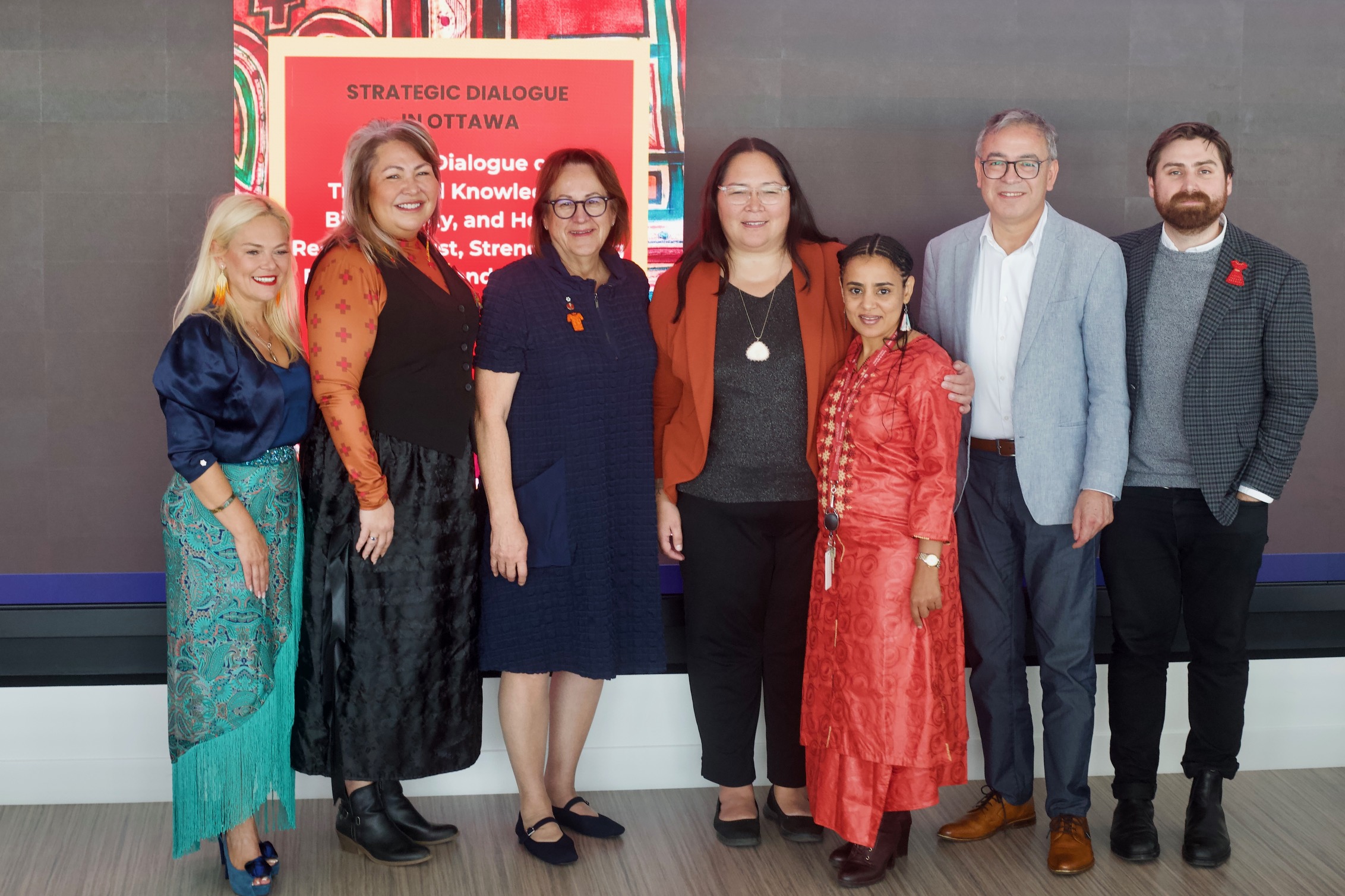
Photo credit: Jacques-Elie Don
A two-day Dialogue on traditional knowledge, biodiversity and health, held on 1–2 October 2025 at the University of Ottawa, Canada, laid a foundation for strengthened Indigenous-led engagement in global health and biodiversity governance, anchored in trust, partnership and co-creation.
The ‘Ottawa Dialogue on Traditional Knowledge, Biodiversity and Health: Restoring Trust, Strengthening Partnerships, and Advancing Indigenous-Led Pathways’ brought together 25 participants, including Indigenous Elders, knowledge holders, community leaders, researchers, policy-makers, medical practitioners and UN representatives. It was hosted by the World Health Organization (WHO), in collaboration with Indigenous Peoples’ Centre for Documentation, Research and Information (Docip), the Ărramăt Project and Tinhinan Canada Association. The event marked a key step in co-developing WHO’s forthcoming Framework on Indigenous Knowledge, Biodiversity and Health, coordinated through the WHO Global Traditional Medicine Centre and the WHO Environment, Climate Change and One Health Department.
Held during events to mark the 10th anniversary of Canada’s Truth and Reconciliation Commission’s Final Report, the Dialogue centred discussions around truth-telling, reparative justice and respectful and rights-based engagement. Elder Claudette Commanda, Algonquin Anishinaabe Elder and Chancellor of the University of Ottawa opened the Dialogue with a land acknowledgement, ceremonial blessing and reflection, reminding participants that Indigenous knowledge must be protected, not misappropriated. Cristina Romanelli, WHO Biodiversity and Health Focal Point, underscored WHO’s role in the Dialogue to support Indigenous leadership in the co-creation process: listening, learning and walking alongside Indigenous partners to co-design a Framework that would serve as a blueprint for respectful engagement across all seven sociocultural regions.
In the high-level opening, presentations from First Nations, Inuit and Métis leaders set the stage for the Framework’s core pillars: trust, reciprocity, free, prior and informed consent (FPIC), equity and a holistic understanding of health and biodiversity grounded in Indigenous rights and worldviews.
Over two days, participants shared perspectives that grounded the discussion in lived experience and community realities, shaping the Framework’s normative, operational and legal foundations. Speakers linked the wellness of lands, waters, biodiversity and peoples and how these are inseparable from health and well-being. The also emphasized how, across Indigenous worldviews, health and biodiversity are inseparable from territory and stewardship.
They also emphasized Indigenous data sovereignty intergenerational and gender equity, cultural safety and the centrality of Indigenous knowledge systems, culture, language and methodologies were central tenets of the Framework.
Discussions also highlighted the creation of the Convention on Biological Diversity Subsidiary Body on Article 8(j) and associated Programme of Work, as a historic step centring Indigenous Peoples leadership in the biodiversity agenda.
Dr Geetha Krishnan, an Ayurvedic physician and WHO Technical Officer, explained that the WHO Global Traditional Medicine Centre was established to catalyse ancestral wisdom alongside modern science for the health of people and the planet, with a dedicated workstream on biodiversity, Indigenous Peoples and traditional knowledge. He reaffirmed that Indigenous Peoples are rights-holders and that respect, reciprocity and FPIC must guide co-design of the new WHO Framework.
Outcomes from the Dialogue will inform the draft WHO Framework on Indigenous Knowledge, Biodiversity and Health, to be shared with Indigenous Peoples across the seven sociocultural regions at the first meeting of the Convention on Biological Diversity Subsidiary Body on Article 8(j) (27–30 October 2025, Panama) and at the second WHO Global Summit on Traditional Medicine (17–19 December 2025, India).
